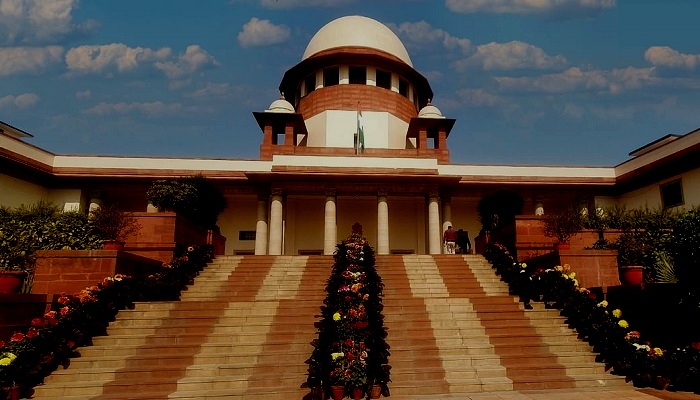On Thursday, the Supreme Court agreed to hear a plea seeking direction to the Centre to impose President’s Rule in West Bengal. This development comes in view of deteriorating law and order situation in the state. Post-poll violence which allegedly started on May 2, the day of assembly election results, is behind the perceived worsening of law and order situation.
Also See: Shadow of Narada-sting case over West Bengal
The plea also sought direction to the Centre to deploy armed/paramilitary forces. The deployment is to the aid of the administrative authorities to bring normalcy in the state and to save it from internal disturbances. But, it has been alleged that the centre has been trying to meddle in the affairs of the state after BJP lost the assembly election.
The PIL has sought setting up of a Special Investigation Team (SIT) for probing the causes and reasons of post-poll violence in West Bengal.
On the plea, a bench of Justices Vineet Saran and Dinesh Maheshwari issued notice to the Centre, West Bengal and Election Commission of India. The plea also sought central and state governments to award compensation to the victims and their family members after ascertaining the nature of loss sustained by them in post-poll violence in the state.
Advocate Hari Shankar Jain appeared for petitioners Ranjana Agnihotri, a UP based practicing lawyer and social worker Jitender Singh. He said that the plea is against post-poll violence in West Bengal.
The Apex Court bench said, “We are issuing notice to respondent number 1, (Union of India), respondent number-2 (West Bengal government) and Respondent number 3 (Election Commission of India).”
The Supreme Court bench, however, did not issue notice to respondent number 4-Mamata Banerjee as the president of Trinamool Congress Party (TMC).
The plea was filed through advocate Vishnu Shankar Jain. The plea said that the PIL has been filed in extraordinary circumstances. It described the circumstances where thousands of residents of West Bengal are being terrorized, penalised and tortured by the workers of TMC for supporting the opposition party BJP during the assembly polls.
It must be noted that this is the perception of the BJP that lost the assembly election. Also, it is worthwhile to note that many fence-seating supporters of BJP had publicly apologized for joining BJP in Kolkata and other cities & towns. It was also indeed found that post-poll violence had impacted supporters of both TMC and BJP.
Also Read: Fake news being circulated regarding the post-poll violence in West Bengal
The plea said, “The petitioners are espousing the cause of thousands of citizens of West Bengal who are mostly Hindus and are being targeted by Muslims to take revenge for supporting BJP as they want to crush Hindus so that for years to come the power may remain with the party of their choice.”
The plea sought that the court should direct the central government to exercise its power conferred by Article 355 and Article 356 keeping in view the deteriorating condition posing a threat to sovereignty and integrity of India.
The plea further alleged that during the assembly elections, TMC party had contested the polls purely “on communal basis arousing the feelings of the Muslims and appealing to them to remain united and vote for their party for their better future”.
The plea said that subsequently BJP made a complaint to ECI against the communal appeal made by TMC party. It also added that the poll panel failed to hold free and fair election conforming the democratic norms and failed to enforce the mandatory provision of section 123 of Representation of People Act which has to be implemented during the election.
Also Read: What led to BJP’s defeat-Important highlights at the conclusion of the West Bengal election
The plea referred the Abhiram Singh case of 2017. It said that in the 2017 case, a seven-judge bench of the top court had ruled that no person can be allowed to contest election by making religious appeal. In the 2017 judgement, SCI had stated that appealing to the ascriptive identities of any candidate and that of the voters constitutes a ‘corrupt practice’ under Section 123(3) of the Representation of the People Act, 1951.
With respect to complaints against displacement of people due to the violence, the National Human Rights Commission (NHRC) has submitted a brief report to the Calcutta High Court. To examine the report, the High Court has adjourned the matter till July 2.
Last week, the Calcutta high court had dismissed a petition by the West Bengal government to recall the June 18 order. In that order a five-judge bench of the High Court had directed the chairperson of the NHRC to constitute a committee to examine all the cases of alleged human rights violations during post-poll violence.
On June 21, NHRC Chairperson Justice (retd) Arun Mishra had constituted the panel headed by former Intelligence Bureau chief Rajiv Jain, following the court’s orders.
The plea seeking president’s rule said, “The election commission remained a silent spectator and the provision (of RP Act) was flagrantly violated.” It added that the Muslim population is about 30 percent in West Bengal due to “illegal Bangladeshi migrants and Rohingia Muslims have been registered as voters without making any proper scrutiny and enquiry”. In about 100 constituencies Muslims’ votes decide the fate of the candidates, the plea further added.
The Apex court is already hearing a batch of pleas related to post-poll violence in the state. It is seeking a probe by an independent agency into the alleged killing of BJP workers and sympathisers.





